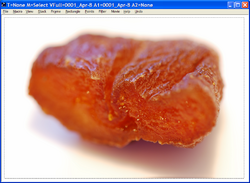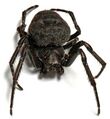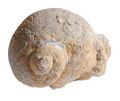Software:CombineZ
 | |
 CombineZM running on Windows XP | |
| Developer(s) | Alan Hadley |
|---|---|
| Stable release | CombineZP
/ June 6, 2010 |
| Operating system | Windows |
| Type | Digital image processing |
| License | GPL |
| Website | www |
CombineZ is Free software image processing software package for creating extended depth of field images. It runs on Microsoft Windows. The current release is CombineZP (CombineZ-Pyramid), successor to CombineZM (CombineZ-Movie) which was based on CombineZ5 (designed for older versions of Windows and is no longer maintained).[1]
CombineZ processes a stack of images (or "Frames") and is most frequently used to blend the focused areas of several partially focused digital photographs in order to create a composite image with an extended depth of field (DOF), created from the in-focus areas of each image.
Other uses
CombineZ has many image manipulation functions that can be used in modifying images (frames) or sets of sequential images (stacks). It can take videos and split them into individual frames which are then manipulated as a stack. For instance, since version CombineZM one can take a movie through a microscope as you wind the focus up or down, and use it for focus stacking. Alternatively, one can convert a sequence of static frames into a movie (including generating intermediate transitional frames for smoothness) or a pseudo-3D 'rocker' image stack animation. File:Karori reservoir 1988 vs 2012.ogg
Limitations
- Does not support 16 bit images
- Images must be in height order (closest to furthest, but can be flipped within the application)
- Supports a limited number of image and video formats
- Only runs on Microsoft Windows
Gallery
13 images were combined to create this image of a jumping spider.
Some images created with CombineZP and taken with a Nikon Coolpix P7000:
Some images created with CombineZM/CombineZP and taken with a Nikon D300 with a macro lens:
References
- ↑ "CombineZM News". Archived from the original on 2009-01-23. https://web.archive.org/web/20090123110407/http://hadleyweb.pwp.blueyonder.co.uk/CZP/News.htm. Retrieved 2009-01-23.
External links
- "Getting started guide for CombineZ5". http://www.hadleyweb.pwp.blueyonder.co.uk/CZ5/Examples/getting_started.htm.
- Easy to read explanation of how CombineZM works
- Page with source code archives
 |














